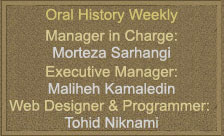| No. 718 | 3 January 2026 |
Experts’ Answers to Oral History Questions100 Questions/11We asked several researchers and activists in the field of oral history to express their views on oral history questions. The names of each participant are listed at the beginning of their answers, and the text of all the answers will be published on this portal by the end of the week. The goal of this project is to open new doors to an issue and promote scientific discussions in the field of oral history.The 372nd Night of Memory – Part 3At the beginning of October, coinciding with Sacred Defense Week, the 372nd Night of Memories was held on September 25, 2025, in the Sooreh Hall of Arts Center. The host opened the program with a warm welcome, reminding the audience that for more than thirty-three years, this gathering has kept the flame of remembrance of the warriors and martyrs alive at the beginning of every month.An Excerpt from the Memoirs of Mikail AhmadzadehOne night, while deploying a reconnaissance patrol, we detected enemy access routes advancing toward our own positions. Under the cover of darkness, they were moving forward to dig trenches. It appeared that the enemy was planning a limited operation against our forces—an action that could have posed a serious threat to the units stationed along the front line.A critique of research in oral HistoryObstacles, Limitations, and New HorizonsOral history is an engaging branch of historical and sociological studies that opens a pathway into the world of lived experiences, memories, and individual narratives. This approach is particularly significant for understanding social, cultural, and identity history, as many layers of people’s lives remain silent in official and written documents. Oral History Weekly Magazine Aims and Regulations
Oral History Weekly Magazine wishes to create a suitable place for thoughts and idea development; Its main field would be “Oral History” and subjects as telling & writing memoirs, writing diaries, travelogues, chronologies, and all other subfields of history which are presented in the form of news, articles, reports, notes, interviews and memoirs can be included. There is no limitation on the length of would-be-sent materials. Mentioning the name, academic background and email is necessary. Articles with complete references and bibliography are more credited and an abstract would quite helpful. Weekly is not about to publish any material consisting insults and libels about other people or anything that brings anxiety to public opinion. Weekly can edit and translate the received materials. The published articles and materials are only the writer’s ideas and Oral History Weekly Magazine has no responsibility about their content. |
 Third Regiment: Memoirs of an Iraqi Prisoner of War Doctor – 11 By Mojtaba al-Hosseini *** Of course. Here is the translation from Persian to American English, rendered in a formal, analytical tone suitable for a historical or political context. *** In late September 1980, I was monitoring real-time reports on our forces’ activities in the village of Nashweh.    |
